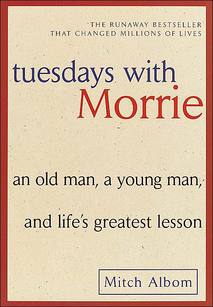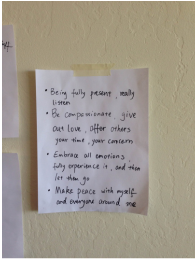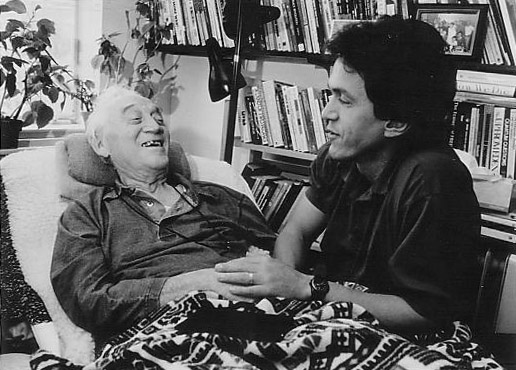"Tuesdays with Morrie" is an extraordinary book. Or to be more precise, Morrie Schwartz is an extraordinary man. I read this book over memorial day weekend and felt the urge to summarize the life lessons I took away from Morrie's stories and post them on my wall. So I did (see picture below). Instead of listing out all the life lessons, I translated the most important learnings into "guidelines" that I aspire to live by in my daily life. Here they are
- Being fully present, really listen
- Be compassionate, give out love, offer others your time, your concern
- Embrace all emotions, fully experience them, and then, let them go
- Make peace with myself and everyone around me
"Tuesdays with Morrie" is a popular book. It is an International best seller and has almost 3,000 book reviews on Amazon. Morrie Schwartz's story was captured by national television show "Nightline" as depicted in the book. After the book was published, there was even a TV movie made out of it in 1999. I don't know why I did not come across this book earlier, but I am thankful that I finally read it. Almost twenty years after Morrie died from ALS, his wise-words are still very relevant to our lives.
"Tuesday with Morrie" reminds me of another popular article ("top 5 regrets people make on death bed") that can help us gain some perspectives about life. Funny how worth-while life lessons all comes from death bed. Here is the summary from the article.
Top 5 regrets people make on death bed
1. I wish I’d had the courage to live a life true to myself, not the life others expected of me.
2. I wish I didn’t work so hard.
3. I wish I’d had the courage to express my feelings.
4. I wish I had stayed in touch with my friends.
5. I wish that I had let myself be happier.
The truth is, intellectually we all understand everything Morrie says. We all nod mechanically when some guru or TED speaker says "money doesn't buy happiness". But how many of us truly live by our own values. Many people say "family" is their number one priority, but a quick examination on how we choose to spend our time reveals otherwise. Therefore, reading a good book like "Tuesdays with Morrie" may bring some tears into our eyes but will have very minimal effect on our lives if we don't take action and live by those lessons. That is why I created this post and put my learnings on my wall.
Below is the more expanded life lessons that I took away from this book. I invite you to think about what you took away from Morrie's book and what you are going to do differently in your life. _
Top 5 regrets people make on death bed
1. I wish I’d had the courage to live a life true to myself, not the life others expected of me.
2. I wish I didn’t work so hard.
3. I wish I’d had the courage to express my feelings.
4. I wish I had stayed in touch with my friends.
5. I wish that I had let myself be happier.
The truth is, intellectually we all understand everything Morrie says. We all nod mechanically when some guru or TED speaker says "money doesn't buy happiness". But how many of us truly live by our own values. Many people say "family" is their number one priority, but a quick examination on how we choose to spend our time reveals otherwise. Therefore, reading a good book like "Tuesdays with Morrie" may bring some tears into our eyes but will have very minimal effect on our lives if we don't take action and live by those lessons. That is why I created this post and put my learnings on my wall.
Below is the more expanded life lessons that I took away from this book. I invite you to think about what you took away from Morrie's book and what you are going to do differently in your life. _
About Death
About Humanity and Love
About Money & Meanings in Life
- To know and accept that you are going to die, it is as natural as life.
- With the perspectives of death, ask yourself what's important and live according.
- "Once you learn how to die, you learn how to live".
- "Death ends a life, not a relationship".
About Humanity and Love
- The fundamental need of human beings is that we want to feel that we mattered
- "The most important thing in life is learn how to give out love, and to let it come in"
- "Love is the only rational act"
- "Love each other or perish"
- We are much more alike than we believe.
- "People are only mean when they're threatened"
- "In the beginning of live, when we are infants, we need other to survive...at the end of life, you need others to survive...in between, we need others as well."
About Money & Meanings in Life
- The culture teaches are more (material goods) is good, but "you can't substitute material things for love or for gentleness or for tenderness or for a sense of comradeship".
- Don't get confused between what we want versus what we need.
- Satisfaction doesn't come from material goods. It comes from giving to other people, being your love, your time and your compassion.
- We are all in such a hurry running around looking for meaning in our lives. When we don't find it in the next thing we pursue, we keep running. Stop and pay attention to the present, to the people in front of us. (this lesson reminded me of an article my friend Smiley wrote about our constant focus on "what's NEXT")
- "Don't cling to things, because everything is impermanent"
- Detachment doesn't mean you don't experience emotions. On the contrary, only when you are not afraid of any emotions and actually experience them fully, can you then detach from them.
- Aging is not just about decay, it's also about growth.
- Unsatisfied, unfulfilled lives lead to endless envy of youth.
- If you find meanings in life, you don't want to go back, you want to go forward.
- "Find what's good and true and beautiful in your life as it is now."
- Respect the other person.
- Know how to compromise.
- Being able to talk openly about what goes on between us.
- Have a common set of values in life.
- Most importantly, believe in the importance of your marriage.
- Forgive yourself and then forgive others.

















